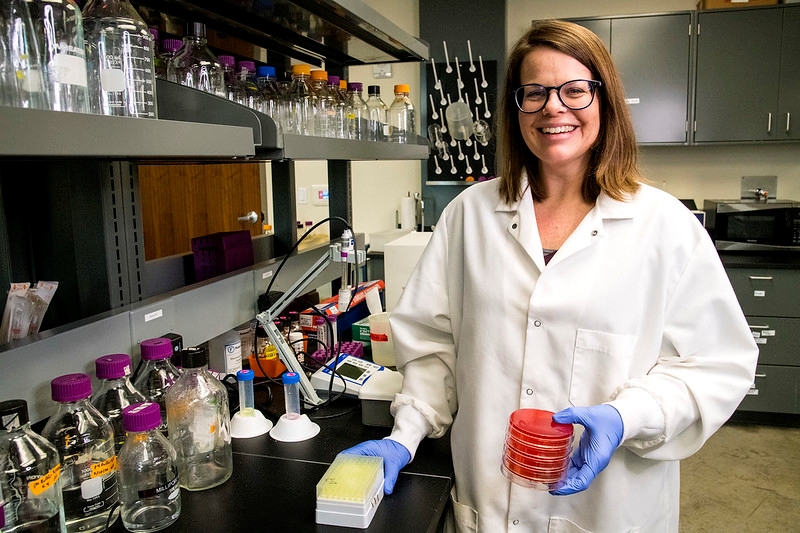
Food safety regulations protect take-out and delivered food from COVID-19, but precautions remain important when interacting with food service personnel.
"There are specific requirements for sanitizing and disinfecting surfaces in the food preparation environment that would inactivate the virus," said Kristen Gibson, who holds a joint appointment as associate professor of food safety and microbiology for the Arkansas Agricultural Experiment Station, the research arm of the University of Arkansas System Division of Agriculture, and the Dale Bumpers College of Agricultural, Food and Life Sciences.
Food service workers are supposed to wash their hands for at least 20 seconds with 10-15 seconds of vigorous scrubbing before and after performing specific job duties. Employees who are sick, especially with gastrointestinal symptoms, are not supposed to work for at least 48-72 hours.
"The key here is that the food is kept safe," Gibson said.
Be Cautious
Precautions remain necessary when people meet people.
"People still have to interact with the delivery people or folks at the restaurant and COVID-19 can still be transmitted that way before people have symptoms or if they are asymptomatic," she said.
The cleaning of surfaces is critical because they are a key point for transfer of the virus that causes COVID-19 from one person to another. Similar to other viruses, such as those that cause the flu, the novel coronavirus can be deposited on surfaces through aerosol droplets when someone sneezes or coughs. It can also be deposited if someone sneezes or coughs into their hand and then touches a surface.
Gibson said there's a possibility that the virus can be transmitted through feces, but that possibility is not well understood. Some reports out of China and anecdotal evidence from people who have been confirmed positive for the virus suggests that perhaps 50 percent of cases present with some sort of gastrointestinal symptoms, like diarrhea or nausea, even in the absence of respiratory symptoms.
"However, the amount of virus expelled in the feces is reportedly quite low," she said, "maybe 1,000 viral particles per milliliter versus millions that are excreted in respiratory secretions."
In any case, once the virus is on a surface, susceptible persons may touch that surface and then touch their mouths or noses. If the virus can then enter the respiratory tract, a person may become infected.
A University of California, Los Angeles study published on March 20 suggested the COVID-19 virus survives on cardboard for up to 24 hours and on hard surfaces like plastic and stainless steel for two to three days.
Gibson thinks the apparent difference in the virus' survival time on different surfaces may result from the sampling methods. To detect an infectious virus particle, she said, it first must be recovered from the suspect surface.
"Recovery of viruses from soft surfaces is inherently more difficult than from non-porous surfaces," Gibson said, "so the difference in reported survival could be due to limitations in the methodology."
Wash Your Hands
Washing hands is the easiest and most effective way to protect yourself from COVID-19, and it is effective because of the structure of the virus.
"This is an enveloped virus which means it has an outer lipid layer surrounding the protein capsid," Gibson said. "Soap breaks down the lipid layer making the viruses more susceptible to inactivation.
"The act of physically rubbing hands will remove the virus as well. If you wash correctly, you should be able to remove hundreds to thousands of virus particles."
Antibacterial agents alone are not helpful because they are specific to bacterial pathogens and not viruses.
When selecting hand sanitizers, people should look for those labeled "antimicrobial," Gibson said. These will target more than just bacteria. These are not helpful against all viruses, but they are effective against respiratory viruses like the COVID-19 virus, and for the same reason that soap works.
Isopropyl alcohol breaks down the lipid layer that protects the virus, rendering it inactive. For that reason, alcohol-based hand sanitizers with more than 60 or 70 percent alcohol help protect against COVID-19.
Stay Vigilant
Gibson said people who are isolating themselves at home and observing social separation practices should remain vigilant about washing their hands, even though they are avoiding other people and public places.
"Many infectious diseases can be transmitted by poor hand hygiene so it is always good practice," she said. "Additionally, why not make handwashing a habit and work toward true behavior change while isolated at home? This way when you do have to go out, it will be second nature."
To learn more about Division of Agriculture research, visit the Arkansas Agricultural Experiment Station website at aaes.uark.edu. Follow us on Twitter at @ArkAgResearch and Instagram at ArkAgResearch.
Read more about how the U of A is Determined to Help
About the Division of Agriculture: The University of Arkansas System Division of Agriculture's mission is to strengthen agriculture, communities, and families by connecting trusted research to the adoption of best practices. Through the Agricultural Experiment Station and the Cooperative Extension Service, the Division of Agriculture conducts research and extension work within the nation's historic land grant education system.
The Division of Agriculture is one of 20 entities within the University of Arkansas System. It has offices in all 75 counties in Arkansas and faculty on five system campuses.
The University of Arkansas System Division of Agriculture offers all its Extension and Research programs and services without regard to race, color, sex, gender identity, sexual orientation, national origin, religion, age, disability, marital or veteran status, genetic information, or any other legally protected status, and is an Affirmative Action/Equal Opportunity Employer.
Topics
Contacts
Office of University Relations, Division of Advancement
University of Arkansas
479-575-5555, urelinfo@uark.edu
Robby Edwards, director of communications
Bumpers College
479-575-4625,
robbye@uark.edu